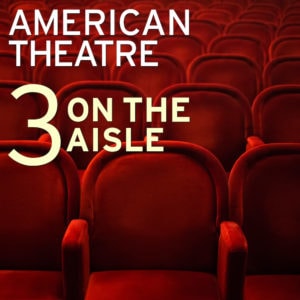
Elisabeth Vincentelli: Here’s a letter from John Stoltenberg, who’s writing from Washington, DC, and he’s asking us a very challenging question:
This is a question for each of you about the prospect of reopening theaters shut down by the pandemic. At what point will you personally feel comfortable going back to a theater to review a live performance? What would you need to know or have happen in order to feel assured enough about your own safety such that you could focus on the performance without being distracted by anxiety about getting infected?
Terry Teachout: Good question. And I have been myself thinking about it in a personal way because there’s a good chance that I’m going to be the first one of us who actually has to grapple with this question. I cover summer theater up in the Berkshires, and Barrington Stage, which is one of New England’s most important summer companies, has now announced plans to resume performances on a limited basis in August with a slate of one-person shows, readings, concerts, and an outdoor performance of South Pacific. They’ve announced that 70 percent of the seats in the mainstage house are going to be taken out of the theater. They’ll be taking all the precautions you’d expect—no intermissions, the things that are going make it easier to prevent congregation and keep the audience safe. I’ve been reviewing Barrington Stage for years, and I’m giving very serious thought as to whether or not I’ll feel comfortable going up there this summer. And I’m not going lie to you: I haven’t made up my mind yet. I want to, I need to. I think it’s important to. And I’m not sure that I have the nerve to. It may well depend on how things are going in this part of the country in Massachusetts come August. I don’t want to get sick. I don’t think anybody wants to get sick. I think everything that they’re doing makes sense. I think they ought to be able to bring this off. And I think it may simply be a question of, in my case, my own individual courage. I wish I could put it differently from that, but that’s the truth.
Peter Marks: Well, that’s interesting, Terry. I will be really curious to see what decision you make. Here’s my worry: What message does it send to other theatergoers if we go? Is that a tacit endorsement of taking the risk if that’s what it feels like? And so the question becomes, Do you have to quarantine your review for two weeks before it runs to make sure you didn’t get sick as a result of going that night to the show? Because you’re becoming a canary in the mine for readers, essentially.
Terry Teachout: That’s a good way of putting it.

Peter Marks: The message I’ve gotten from my organization [The Washington Post] is that I won’t be compelled to do anything I don’t feel is safe. And that really goes to the heart of John’s question. You know, when does that happen? Well, how is that a different decision for us than it is for the vast majority of governors and producers, to take two groups in particular, and what they say? My last thought is, I don’t understand what Barrington Stage is doing. I don’t understand how they feel comfortable knowing that this is going to be a safe situation when there’s still advisories from almost every sector of the scientific community saying stay at home. So at this point, John, I am going to really err on the side of caution. I’m not going to think about so much of the value of the art as the value of human lives.
Terry Teachout: The [Wall Street] Journal is not requiring me to do anything that I feel uncomfortable doing. This decision is going to be left in my hands. And we’ve got quite a bit of time between now and then to see how things change. Maybe they will change their minds.

Elisabeth Vincentelli: Yeah, for me it’s tricky because so much of the decision also depends on other people’s behavior. And I am not encouraged by the very lax attitude of too many people I see around me on the street. So am I going to go to a theater where some idiot would decide that they don’t have to wear a mask because they’re a superior specimen of the human race that doesn’t get sick or doesn’t pass along sickness? I mean, there’s a sense of collective responsibility that’s engaged. And when I see the lack of respect for others that people on the street show, I am really not encouraged by the discipline that will be required. Because the thing is, if we go to the theater, we all have to show discipline, and that seems to be too much for some who seem to think that they can’t be bothered with it. You know what I mean? Like, if you can’t trust others to behave, it’s part of the social contract. Going to the theater is a social contract with others. Even in the best of times, you turn off your phone, you do all that, and we all know there’s always someone who doesn’t do it or doesn’t care. Except now it can have a lot worse consequences. So I don’t want to be around the equivalent of the idiot who doesn’t want to turn off their phone because there’s such an important call. Maybe this person thinks that they’re not going to wear a mask

Terry Teachout: [In a] small theater, you are controlling access to that room. One thing you can make sure, and what they [Barrington Stage] will make sure, is that everybody who goes in there has got a mask on. I haven’t gone into excruciating detail about their plans, but they have gone into some detail in announcing them. Everything sounds smart. Everything seems to make sense on paper. It sounds to me like it ought to work. The question is, How confident am I of the world of the virus? I just don’t know.
Peter Marks: Okay. So let me present to you a theater phenomenon that you both are very well acquainted with, and that is the theater cough. You know that in a boring production or in a lull in a production, it’s an infectious reflex. One person coughs, you hear 10 people cough. Even if they don’t have to cough, they cough. You know, we’ve listened to this for years and years and years. I assume you guys know what I’m talking about.
Terry Teachout: Oh god yes.
Peter Marks: So let’s just say—
Elisabeth Vincentelli: Oh, yes.
Peter Marks: So I’m just wondering: At the first theater cough, which now feels like a sinister possible reflex, how does that not clear the theater or how do you not become obsessed with that person and whether or not they’re spreading, they’re spraying? I’m very reluctant to subject myself even to that worry. That really speaks to the feeling that that person can’t harm me. You know, you’ve got to feel that person cannot endanger my health any more than, you know, you are subjected to in any public place, the possibility of getting a cold or sick.
Elisabeth Vincentelli: I’m certain that we’re not going to see a production of Camille for a very long time.
[Laughter]
Peter Marks: That’s a good point. That’s a very good point….
Terry Teachout: [Barrington Stage Artistic Director] Julianne Boyd is one of the smartest, most serious theater people I know. There is no way that she’s going into this casually or lightly. Insofar as I’m capable of trusting anybody’s judgment, I would trust hers. But it’s hers over mine, and I’m the one ultimately who has to say, Am I going to go in and sit in that seat and maybe be, you know, four seats away from the cougher? And if that happens, what do I do?
Peter Marks: Right.
Terry Teachout: Come back and talk to me in August. That’s all I can tell you right now.
Elisabeth Vincentelli: Things have been changing so fast. Who knows what’s going to happen between May and August?
Terry Teachout: That’s right.
Elisabeth Vincentelli: It’s just impossible to say. I mean, some countries like South Korea, they were doing fine and apparently now they have more clusters reappearing. I mean, who knows? These guys were doing fine.
Peter Marks: I know, but we know there’s not going to be a cure for this by August. I mean, we know. No one’s going to come with a miracle, that’s just not going to happen. Ultimately, though, the three of us, we’re not going to be able to decide this. It’s going to be an ongoing debate and question that we’re going to struggle with.
Terry Teachout: And to paraphrase the old saying: If you want to hear God laugh, announce a theater schedule.
[Laughter].
Peter Marks: Right. Perfect.




